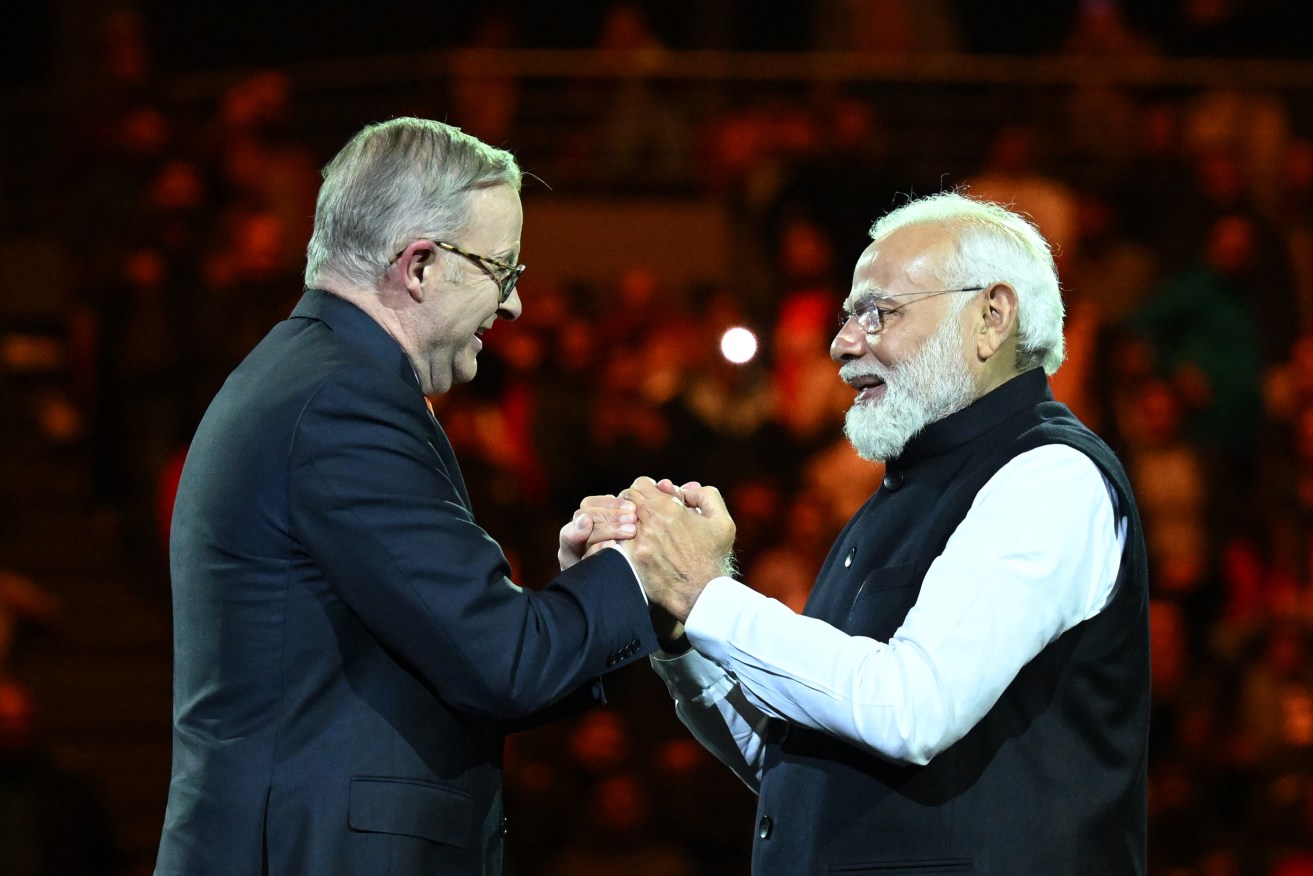Rockstar reception for Indian PM’s Australian tour
Prime Minister Anthony Albanese has welcomed the finalisation of a new migration pact with India as he hosts his counterpart Narendra Modi for bilateral talks.

Prime Minister Anthony Albanese with India’s Prime Minister Narendra Modi at a stadium event in Sydney on Tuesday. Photo: AAP/Dean Lewins
Australia is working to boost economic and security ties with India as well as work to accelerate the transition to clean energy after a new pact was signed with the Quad, which also includes the United States and Japan.
But the government is being pushed to take a more hardline approach towards Mr Modi’s reluctance to openly criticise Russia for invading Ukraine as well as human rights abuses.
Mr Albanese welcomed Mr Modi to Admiralty House, where he was also greeted by Governor-General David Hurley ahead of bilateral talks.
Business leaders and delegates are also on the Indian prime minister’s schedule during his first visit to Australia in 10 years and the two prime ministers’ sixth meeting in 12 months.
Albanese said it was wonderful to have hosted Mr Modi at a rockstar stadium reception at Sydney’s Olympic Park on Tuesday night.
“The (Indian) community here are a very important part of our vibrant multicultural democracy,” he said during his opening remarks ahead of he bilateral meeting.
“I’m looking forward to returning to India in just a few months for the G20 meeting.”
In earlier media interviews, Albanese was pushed on whether he would raise human rights concerns and freedom of speech crackdowns in India that have been raised by advocacy groups and the diaspora in Australia.
Albanese said Modi was certainly a popular prime minister but didn’t please everyone as “it’s a democracy”.
“Australia always stands up for human rights … anywhere in the world,” he told ABC TV.
But he wouldn’t confirm whether the issue would be raised, saying he engaged with world leaders one-on-one and would not leak messages.
Foreign Minister Penny Wong said Australia maintained a consistent approach to human rights and democratic principles and “we articulate that appropriately with friends and partners and we’ll continue to do that”.
She said India was an important strategic relationship for Australia as both democratic nations were pushing for a strong and stable Indo-Pacific region.
But Wong wouldn’t pre-empt what would be discussed during the bilateral meeting, as Mr Modi pushes to have alternative Indian medicine accessible through Medicare.
The foreign minister was also pressed on whether Australia would bring up India’s ties with the Kremlin and import of Russian arms.
New Delhi has also drawn criticism for not expressly condemning Russia for its invasion.
Wong said Modi’s meeting with Ukrainian President Volodymyr Zelenskiy over the weekend, where he signalled support for the nation’s sovereignty, sent an important message.
“I thought that was a very important meeting and sent a very important signal about the opposition to Russia’s illegal and immoral war against Ukraine,” she said.
Albanese added that “India is responsible for its own international relations,” referring to India’s history of non-alignment.
“India is a great supporter of peace and security and stability in our region,” he said.
Opposition foreign affairs spokesman Simon Birmingham will also meet the Indian prime minister.
Pressed on what issues he would raise, Birmingham said he wanted to see an expansion of the free trade agreement and a boost to economic and defence ties.
On human rights, he said Australia “should always be consistent and predictable when it comes to where and to how we apply our values in the world”.
-AAP




